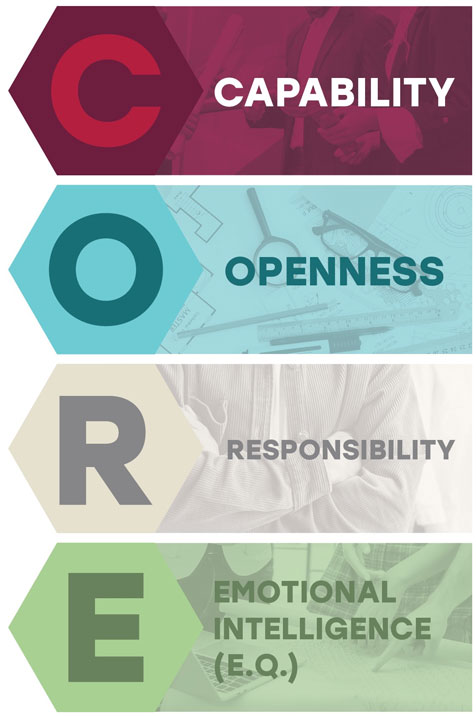The C.O.R.E. Scoring System: A Smarter Way to Interview
- Information
- C
Capability: Can They Do the Job?
The first question we ask is: Can they do the job? We evaluate a candidate’s capability by thoroughly assessing their skills, experience, and past performance to ensure they have the technical know-how and expertise needed to excel in the role.
- Information
Why it's important: Hiring someone who doesn’t have the capability to perform the job will quickly lead to frustration and disappointment for both the employee and your team. A candidate with the right skills can hit the ground running, saving your team time and resources and contributing effectively to the company’s goals. Ensuring capability early in the process sets both your new hire and your team up for success from the start.
- Information
- O
Openness: Will They Grow with You?
Next, we look at openness—how willing a candidate is to learn, grow, and adapt. Are they open to constructive criticism? Do they show a commitment to self-improvement? Can they have honest conversations about their strengths and weaknesses?
- Information
Why it's important: Employees who are open to learning and growth are more likely to develop into high-performing team members. In a fast-changing work environment, adaptability is crucial for long-term success. If a candidate is open to feedback, they’ll be able to adjust and improve, making them more resilient in the face of challenges. Moreover, those who can reflect on their own weaknesses and strengths tend to be more self-aware, which contributes to better team dynamics and overall success.
- Information
- R
Responsibility: What Drives Them?
We assess responsibility to understand a candidate’s work ethic, motivation, and how they approach accountability. Are they proactive in taking ownership of their tasks? Do they hold themselves accountable for their actions and outcomes?
- Information
Why it's important: A candidate’s sense of responsibility is a strong indicator of how self-driven and reliable they will be in the workplace. People who take ownership of their work are often more productive and committed to achieving the best results. This quality ensures that employees can be trusted to manage their time and responsibilities effectively, leading to greater team efficiency and fewer issues down the road. High responsibility also correlates with leadership potential—responsible individuals often emerge as natural leaders within teams.
- Information
- E
Emotional Intelligence (E.Q.): How Do They Handle Conflict and Work with Others?
Why it's important: Emotional intelligence is essential for building strong relationships, fostering effective teamwork, and navigating the complexities of the workplace. A candidate with high emotional intelligence is more likely to be a strong communicator, a good listener, and someone who contributes positively to team dynamics. They’re also better at handling conflict constructively, which leads to a more harmonious and productive workplace. E.Q. plays a major role in how well an employee will interact with others, both inside and outside your team, making it a crucial factor for long-term success and cultural fit.
- Information
Why it's important: Emotional intelligence is essential for building strong relationships, fostering effective teamwork, and navigating the complexities of the workplace. A candidate with high emotional intelligence is more likely to be a strong communicator, a good listener, and someone who contributes positively to team dynamics. They’re also better at handling conflict constructively, which leads to a more harmonious and productive workplace. E.Q. plays a major role in how well an employee will interact with others, both inside and outside your team, making it a crucial factor for long-term success and cultural fit.







